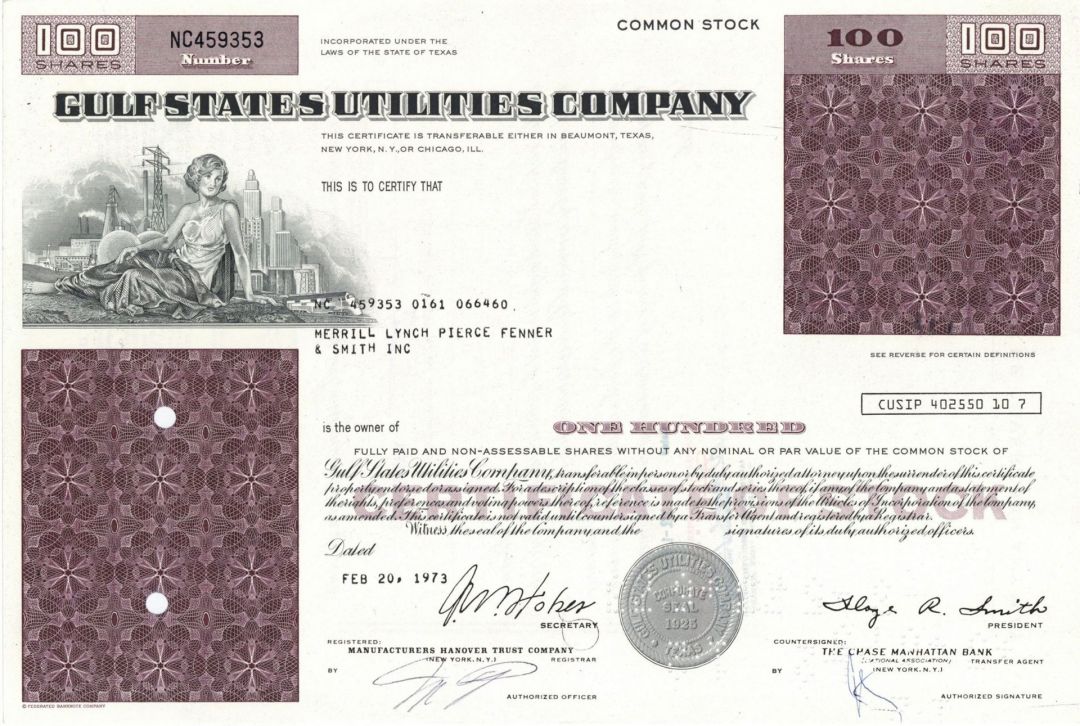Gulf States Utilities Co. - 1970's dated Stock Certificate
Inv# GS1130 StockUtility Stock printed by Federated Banknote Company. Female figure seated at top left with buildings, etc in background. Available in Purple or Red. Please specify color.
Entergy Texas, previously known as Gulf States Utilities (GSU), is a company engaged in the generation and distribution of electric power, with its headquarters located in The Woodlands, Texas. Established in 1911 as Eastern Texas Electric, it served as a holding company for Stone & Webster. On August 25, 1925, Gulf States Utilities Company was officially incorporated in the state of Texas.
The company expanded and relocated its headquarters in 1979 to the Edison Plaza office tower, which remains the tallest building in Beaumont. Its previous headquarters, the Liberty-Pearl building (formerly the Edson Hotel from 1929 to 1955), still accommodates much of its telecommunications equipment, including the microwave radio systems, and is the second tallest building in Beaumont. Additionally, in the late 1970s, construction commenced on the River Bend Station nuclear power plant. Cost overruns associated with the nuclear facility, coupled with high interest rates ranging from 24% to 30%, a CEO of GSU advocating for a "nuclear plant within the company," and a downturn in the regional economy during the early to mid-1980s nearly led GSU to bankruptcy. In fact, trading of the company's stock was suspended on the New York Stock Exchange for a day as it plummeted over 75%, ultimately settling at less than $2 per share. The former chief financial officer, Joseph L. Donnelly, Jr., is credited with averting the company's filing for Chapter 11 and served as its CEO. (see link below) GSU was acquired by Entergy Corporation on January 1, 1994, after initially accepting a $19 per share offer from SWEPCO. At that time, Entergy's CEO, Edwin Lupeburger, insisted on another opportunity to purchase GSU. The Entergy Board of Directors held a late-night conference call, and the following morning, they presented a $20 per share offer to GSU. Consequently, GSU was required to pay SWEPCO an estimated $10 million to withdraw from their agreement. At that point, GSU had 578,000 customers throughout southern Louisiana and East Texas. Edison Plaza was utilized by Entergy as its Texas headquarters. In 1999, Joe Domino, a highly regarded long-term employee who began his career as an engineer and later became the manager of the Sabine Station plant (located near Bridge City), commenced his 14-year term as president of Entergy Texas. The River Bend Station continued to pose challenges for its new owners due to lawsuits from the project's investors and penalties imposed by the Nuclear Regulatory Commission concerning safety issues at the plant.
Gulf States Utilities remains a legally recognized entity in Texas. Recently, however, Entergy altered GSU's Texas designation from Entergy Gulf States to Entergy Texas, Inc., and integrated the GSU Louisiana service area with its Entergy-Louisiana division. Entergy Texas informed the Public Utility Commission of Texas that it would not participate in the Texas Interconnection managed by ERCOT, opting instead to remain regulated and part of the extensive Eastern Interconnection (one of the two primary power grids in the United States, alongside Texas' own grid, which encompasses 75% of the state and has only DC Direct Current connections to other states). The connection in Dayton, Texas, between GSU/Entergy and the Texas Interconnection (through CenterPoint Energy) was utilized only once; this occurred after Hurricane Ike to supply power to the water pumps on the north side of Lake Houston and other impacted regions. This action was taken following Texas Governor Rick Perry's directive for CenterPoint to ask Entergy to deactivate the connection. In 2013, Joe Domino was succeeded by Sallie Rainer, marking the beginning of Entergy Texas's transition to The Woodlands.
A stock certificate is issued by businesses, usually companies. A stock is part of the permanent finance of a business. Normally, they are never repaid, and the investor can recover his/her money only by selling to another investor. Most stocks, or also called shares, earn dividends, at the business's discretion, depending on how well it has traded. A stockholder or shareholder is a part-owner of the business that issued the stock certificates.











Ebay ID: labarre_galleries